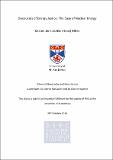Files in this item
Discourses of energy justice : the case of nuclear energy
Item metadata
| dc.contributor.advisor | McCauley, Darren | |
| dc.contributor.advisor | Warren, Charles Raymond | |
| dc.contributor.author | Jenkins, Kirsten | |
| dc.coverage.spatial | 328 p. | en_US |
| dc.date.accessioned | 2017-02-09T10:48:10Z | |
| dc.date.available | 2017-02-09T10:48:10Z | |
| dc.date.issued | 2017-06-21 | |
| dc.identifier.uri | https://hdl.handle.net/10023/10255 | |
| dc.description.abstract | The energy sector faces sustainability challenges that are re-working the established patterns of energy supply, distribution and consumption (Anderson et al. 2008; Haas et al. 2008; Stern 2008; Shove and Walker 2010). Amidst these challenges, socio-technical energy transitions frameworks have evolved that focus on transitions towards decarbonised, sustainable energy systems (Bridge et al. 2013). However, the ‘socio-‘ or social is typically missing as we confront climate and energy risks in a moral vacuum (Sovacool et al. 2016). The energy justice framework provides a structure to think about such energy dilemmas. However, the full extent and diversity of justice implications within the energy system have been neglected. Thus, borrowing from and advancing the framework this research explores how energy justice is being articulated with attention to three emergent areas of growth, the themes of: (1) time, (2) systems component and (3) actor. It does so through a case study of nuclear energy, which was chosen because of its points of enquiry with regards to these three areas of growth, and its historical and on-going importance in the UK energy mix. Using results from 36 semi-structured interviews with non-governmental organisations and policy actors across two case studies representative of the nuclear energy stages of energy production and of waste storage, disposal and reprocessing – the Hinkley Point and Sellafield nuclear complexes – this research presents new insights within each of these previously identified areas of development. It offers the contributions of (1) facility lifecycles, (2) systems approaches and (3) the question of ‘justice by whom?’ and concludes that the energy justice framework can aid energy decision-making in a way that not only mitigates the environmental impacts of energy via socio-technical change, but also does so in an ethically defensible, socially just, way. | en_US |
| dc.language.iso | en | en_US |
| dc.publisher | University of St Andrews | en |
| dc.rights | Attribution-NonCommercial-NoDerivatives 4.0 International | * |
| dc.rights.uri | http://creativecommons.org/licenses/by-nc-nd/4.0/ | * |
| dc.subject | Energy justice | en_US |
| dc.subject | Nuclear energy | en_US |
| dc.subject | Energy policy | en_US |
| dc.subject | Socio-technical systems | en_US |
| dc.subject | Ethics | en_US |
| dc.subject.lcc | TJ163.2J4 | |
| dc.subject.lcsh | Power resources--Social aspects--Case studies | en |
| dc.subject.lcsh | Environmental justice | en |
| dc.subject.lcsh | Distributive justice | en |
| dc.subject.lcsh | Nuclear energy--Great Britain--Social aspects | en |
| dc.title | Discourses of energy justice : the case of nuclear energy | en_US |
| dc.type | Thesis | en_US |
| dc.contributor.sponsor | Economic and Social Research Council (ESRC) | en_US |
| dc.type.qualificationlevel | Doctoral | en_US |
| dc.type.qualificationname | PhD Doctor of Philosophy | en_US |
| dc.publisher.institution | The University of St Andrews | en_US |
The following licence files are associated with this item:
This item appears in the following Collection(s)
Except where otherwise noted within the work, this item's licence for re-use is described as Attribution-NonCommercial-NoDerivatives 4.0 International
Items in the St Andrews Research Repository are protected by copyright, with all rights reserved, unless otherwise indicated.


